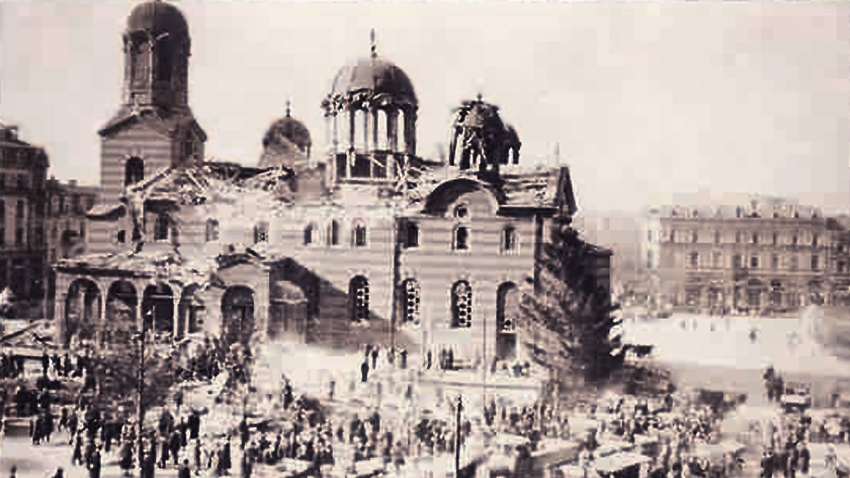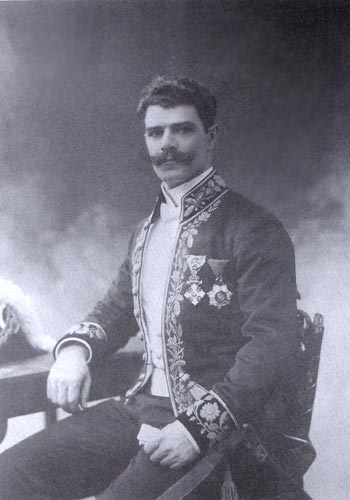The bloodiest ever terrorist action in this country’s history was carried out on 16 April 1925 – that was the St. Nedelya Church Assault. The ultra-left wing of the Bulgarian Communist Party /banned by the court in 1923/ was the perpetrator. The party’s activists had been instructed by the Soviet Comintern to respond to the ban with violence. The assault’s plan envisaged the murder of a high ranking official first, whose burial service would gather the political and military elite of the country – the terrorists’ target. Thus the authorities would be beheaded and the communists could make use of the critical situation within the state.
 Over 150 fell victims of the terrorist act and more than 500 people were wounded. The death toll exceeded 200 with those who died of their wounds later on. Lucky chance saved all the members of the government, who were only slightly injured. Tsar Boris III was not in the church – he was attending the funerals of his companions, killed 2 days earlier in an assault attempt against him in the Arabakonak mountain pass. April 16th was a black day for Bulgaria – it lost numerous famous and worthy persons – 12 generals, 15 colonels, 7 sub-colonels, 3 majors, 9 captains, 3 MPs and many citizens, children among them.
Over 150 fell victims of the terrorist act and more than 500 people were wounded. The death toll exceeded 200 with those who died of their wounds later on. Lucky chance saved all the members of the government, who were only slightly injured. Tsar Boris III was not in the church – he was attending the funerals of his companions, killed 2 days earlier in an assault attempt against him in the Arabakonak mountain pass. April 16th was a black day for Bulgaria – it lost numerous famous and worthy persons – 12 generals, 15 colonels, 7 sub-colonels, 3 majors, 9 captains, 3 MPs and many citizens, children among them.
Nedyalko Kolushev was one of the victims. He was one of the really well-prepared diplomats from the early 20th c., with that Renaissance spirit – a person, who had devoted his activity to the national cause for unification of all lands, inhabited with Bulgarians.
 “In 1903 he started making trips to Albania, he got interested in the Albanian liberation issue and in 1906 he was assigned a Bulgarian representative at Montenegro’s then-capital Cetinje,” says Dr. Iliana Ilieva, the author of a monograph book, named The Albanian Issue through the Eyes of the Bulgarian Diplomats (1908 – 1912). The lady is also a researcher of Dr. Nedyalko Kolushev’s diplomatic service.
“In 1903 he started making trips to Albania, he got interested in the Albanian liberation issue and in 1906 he was assigned a Bulgarian representative at Montenegro’s then-capital Cetinje,” says Dr. Iliana Ilieva, the author of a monograph book, named The Albanian Issue through the Eyes of the Bulgarian Diplomats (1908 – 1912). The lady is also a researcher of Dr. Nedyalko Kolushev’s diplomatic service.
“He was a Renaissance person and his spirit was that of the Renaissance, too. He considered that 400 – 450 km long border between the Bulgarian and the Albanian ethnicity an essential one. He saw the lack of any discrepancies between the Bulgarians and the Albanians, also the good attitude of the latter towards us and also that it could be used in the interest of the Bulgarian national cause. Kolushev travelled all the time and remained in relation with their ‘bosses’ – notable Albanians ahead of the clans – educated individuals, travelling across Europe. He established deep connections that no other diplomat had managed to praise with,” Dr. Ilieva says.
The will of Kolushev was to use the energy of the Albanian liberation movement in favor of our national interests in Macedonia. He worked constantly on the creation of conditions for active cooperation between Bulgarians and Albanians. However, Bulgaria remained a passive observer of the processes within the Albanian lands. This passive stance was reasoned by our state interest, Dr. Ilieva says.
Unfortunately the personality of great diplomat Nedyalko Kolushev sank in oblivion after 16 April 1925. The monography of Dr. Ilieva reveals his huge labor and Renaissance enthusiasm. His work can serve as an example of true devotion to the diplomatic activities.
English version: Zhivko Stanchev
Today is Cheesefare Sunday. According to Orthodox tradition, this day is observed on the eve of Great Lent, when Christians seek and give forgiveness to each other . It is also known as Sirni Zagovezni because it marks the last day before Lent, when..
Priest Lyubomir Bratoev is a direct participant in the events of t he founding of the Bulgarian Orthodox Church community in Berlin . He came to the capital of East Germany in the late 1980s as a doctoral student. And, like a typical Orthodox Christian..
After nearly 35 years, the Bulgarian Orthodox Church Community in London has its own church in the central part of the British capital, in close proximity to the Bulgarian Embassy. There, in the prestigious Kensington district, next to Hyde Park and..
Today is Cheesefare Sunday. According to Orthodox tradition, this day is observed on the eve of Great Lent, when Christians seek and give forgiveness to..

+359 2 9336 661
